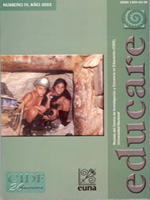Liderazgo educativo y retos de la educación superior en el siglo XXI: hacia la visión y la acción
DOI:
https://doi.org/10.15359/ree.2003-4.5Abstract
In this article, we are developing some ideas and proposals for an educational leadership exercise in order to assume higher education´s main challenges in the XXI century. In this reflection we are taking into consideration the universities´commitments in the construction of more fair and equitable societies according to its necessities and demands in a historical moment distinguished by globalization and scientific technological development. Therefore, we have to emphasize the permanent links between education and economic and social development; besides, we take back some of the ideas presented at the higher education world conference in 1998, which evidenced the implications of the main challenges that education faces in the XXI century. For that reason it is of vital importance, a type of leadership that responds effectively to those challenges through belligerent, participative and precise actions.
References
Aguilar, M. La Misión del al Universidad Latinoamericana ayer y hoy.
Revista Ciencias Sociales. XLII (83) 23-35.
Alfaro, G. (Compilador) Universidad Nacional. Maestiía en Educación (20001) Compendio de Lecturas. Curso de Liderazgo Académico. Heredia. Costa Rica.
Banco Interamericano de Desarrollo (1994). A la búsqueda del siglo XXI: Nuevos caminos de desarrollo en Costa Rica.
Castro I. ( 1997) El pragmatismo Neoliberal y las desigualdades educativas en América Latina. Revista Mexicana de Sociología. 49 (3) 189-205.
Colegio de Licenciados y Profesores en Letras, Filosofía, Ciencias y Artes ( 1996). Desafíos de la educación costarricense en la fonnación del ser Humano para la sociedad del Nuevo Siglo. En Memoria II Congreso Nacional de Educación.
Diario Reflexivo Curso Liderazgo. (2001) Notas Personales: Construyendo un Concepto Heredia, C.R.
Fisher, R. Sharp Alan. ( 1999). El Liderazgo Lateral. Bogotá, Colombia:
Grupo Editorial Norma.
Grinberg J. (1999). Desafíos y Posibilidades para el Futuro de la Educación. El Papel del Docente Líder. Eduforum @utdt. eduConferencia
Hadad,W.D. La Globalización de la Economía: Repercusiones en la Educación y en la Formación de Competencias. Revista Perspectivas, Vol. XXVII N. l, marzol997.
Sarramona J. (1997). Fundamentos de Educación. Madrid, España; Editorial CEAC S.A.
Torres, R. ( 1999).Nuevo Rol docente: Que modelo de formación, para que modelo educativo. Revista Paraguaya de Sociología. Año36 N. 105 Mayo-Agosto 1999, p.7-28
Tunnermann ,C (1998). Transformación de la Educación Superior: Retos y Perspectivas. Heredia ,Costa Rica, Editorial Universidad Nacional.
UNESCO. Conferencia Mundial sobre Educación Superior. La Educación
Superior en el Siglo XXI. ( 1998) París, Francia.
Weiler, H (1996) ¿ Porqué fracasan las reformas? La política educativa en Francia y en la República Federal de Alemania. En Revista Universidad Futura. 2 (4) 34-44.
Published
How to Cite
Issue
Section
License
1. In case the submitted paper is accepted for publication, the author(s) FREELY, COSTLESS, EXCLUSIVELY AND FOR AN INDEFINITE TERM transfer copyrights and patrimonial rights to Universidad Nacional (UNA, Costa Rica). For more details check the Originality Statement and Copyright Transfer Agreement
2. REUTILIZATION RIGHTS: UNA authorizes authors to use, for any purpose (among them selfarchiving or autoarchiving) and to publish in the Internet in any electronic site, the paper´'s final version, both approved and published (post print), as long as it is done with a non commercial purpose, does not generate derivates without previous consentment and recognizes both publisher's name and authorship.
3. The submission and possible publication of the paper in the Educare Electronic Journal is ruled by the Journal’s editorial policies, the institutional rules of Universidad Nacional and the laws of the Republic of Costa Rica. Additionally, any possible difference of opinion or future dispute shall be settled in accordance with the mechanisms of Alternative Dispute Resolution and the Costa Rican Jurisdiction.
4. In all cases, it is understood that the opinions issued are those of the authors and do not necessarily reflect the position and opinion of Educare, CIDE or Universidad Nacional, Costa Rica. It is also understood that, in the exercise of academic freedom, the authors have carried out a rogorous scientific-academic process of research, reflection and argumentation thar lays within the thematic scope of interest of the Journal.
5. The papers published by Educare Electronic Journal use a Creative Commons License:














 The articles published by Educare Electronic Journal can be shared with a Creative Commons License:
The articles published by Educare Electronic Journal can be shared with a Creative Commons License: 



